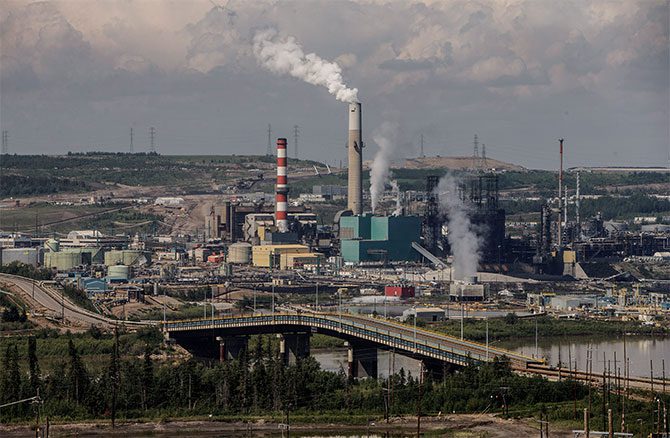ENVIRONMENTAL DEFENCE, STAND.EARTH
Governments must act and reign in Bay Street’s financing of climate chaos through regulatory reform and the swift passage of the Climate-Aligned Finance Act (CAFA)
Toronto | Traditional territories of the Mississaugas of the Credit, the Anishinaabeg, the Haudenosaunee, and the Wendat – In light of a shocking new report from the Toronto Climate Observatory, that exposes Toronto’s top financial institutions for financing of over $1.43 trillion CAD ($1.1 trillion USD) in fossil fuel companies in 2022, making the sector the fifth largest climate polluter in the world, only after China, United States, India and Russia, Stand.earth and Environmental Defence are calling for urgent policy action. The report was published as thousands of global finance leaders gathered in Toronto for the Principles for Responsible Investment (PRI) conference.
“Just eighteen Toronto-based banks, public pensions and asset managers are responsible for one hundred times the reported climate pollution of the City of Toronto, and aren’t tackling this problem fast enough. These emissions are not accounted for – they are effectively being hidden or laundered through off-shoring and pushing them down to consumers when they should be addressed by these banks and pensions. They must be held to account. This is why we urgently need regulation from our federal government and agencies to get these institutions aligned with science and taking real action to curb their emissions,” said Richard Brooks, Climate Finance Director with Stand.earth.
The findings show that banks, asset managers, and pension funds headquartered in Toronto were responsible for at least 1.44 billion tonnes of CO2 emissions in 2022—nearly double Canada’s total emissions that year. Without swift, decisive regulation, Toronto’s financial sector will continue to undermine global efforts to limit catastrophic climate change.
Some institutions have been found to be underreporting their share of climate pollution by over 2,000 per cent. The report uncovered other significant discrepancies between the emissions reported by financial institutions and the actual emissions they facilitate.
“Just months after devastating floods wrecked havoc across the City of Toronto, this report reveals that a handful of Toronto-based financial institutions are financing the climate crisis at an astonishing rate. Its findings underline the urgent need for climate-aligned financial regulations to fix this problem. The City of Toronto should urge the federal and provincial governments to enact such regulations, in order to support the City’s financial sector through the energy transition.” said Alex Walker, Climate Finance Program Manager with Environmental Defence.
As Canada’s financial hub, Toronto has a direct responsibility to address the climate impact of its financial industry. All levels of government—from the City of Toronto, to the Provincial and Federal governments—must act and implement stronger regulations and ensure that its financial institutions develop credible, science-aligned climate transition plans.
We continue to call on Canadian financial institutions and government to:
- Pass the Climate-Aligned Finance Act: The NGOs are urging the swift passage of this landmark legislation, which would mandate financial institutions to develop and implement credible climate transition plans aligned with limiting global warming to 1.5°C. The Act would also enforce mandatory reporting of all financed emissions, including Scope 3 emissions, ensuring transparency and accountability.
- Stop Financing Fossil Fuels: NGOs are calling on Canada’s financial institutions to end all new financing for fossil fuel projects and commit to transitioning their portfolios to clean energy investments. The report found that in 2022, Toronto’s largest financial institutions funneled over $1.43 trillion CAD into fossil fuel companies, resulting in 1.44 billion tonnes of CO2 emissions.
- Support for Green Investment: The groups are advocating for financial regulations that would incentivize investment in renewable energy and other sustainable technologies. This includes the establishment of a national green taxonomy that excludes fossil fuel investments, ensuring that only truly sustainable projects receive financial backing.
- Enact Enhanced Regulatory Oversight: NGOs are calling on federal regulators, including the Office of the Superintendent of Financial Institutions (OSFI) and the Canadian Securities Administrators (CSA), to enforce strict climate risk assessments, transparency requirements, and accountability for financial institutions that continue to fund high-emitting sectors.
-30-
Stand.earth is an international nonprofit environmental organization with offices in Canada and the United States that is known for its groundbreaking research and successful corporate and citizen engagement campaigns to create new policies and industry standards in protecting forests, advocating the rights of Indigenous peoples, and protecting the climate. Stand manages the Global Fossil Fuel Divestment Commitment Database.
Environmental Defence is a leading Canadian environmental advocacy organization that works with government, industry, and individuals to defend clean water, a safe climate, and healthy communities.
For more information:
Lindsay Meiman, Media Director Stand.earth, lindsay@stand.earth
Alex Ross, Communications Manager Environmental Defence, media@environmentaldefence.ca






